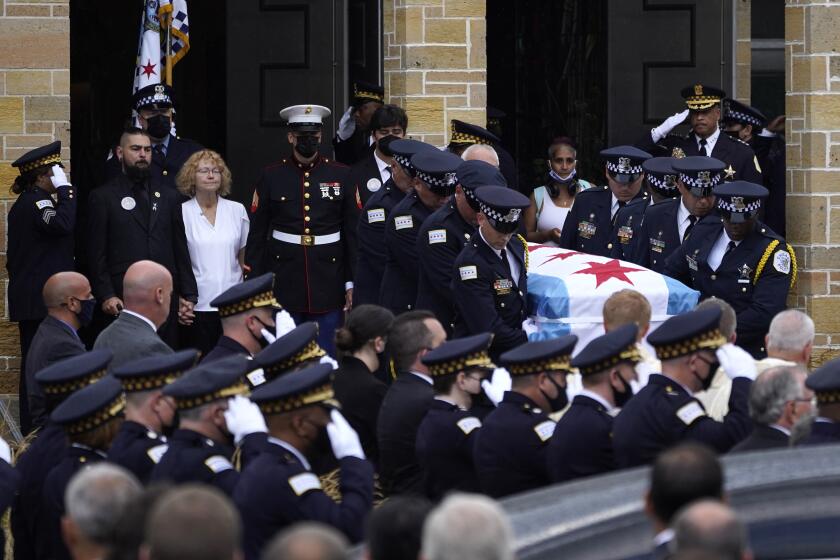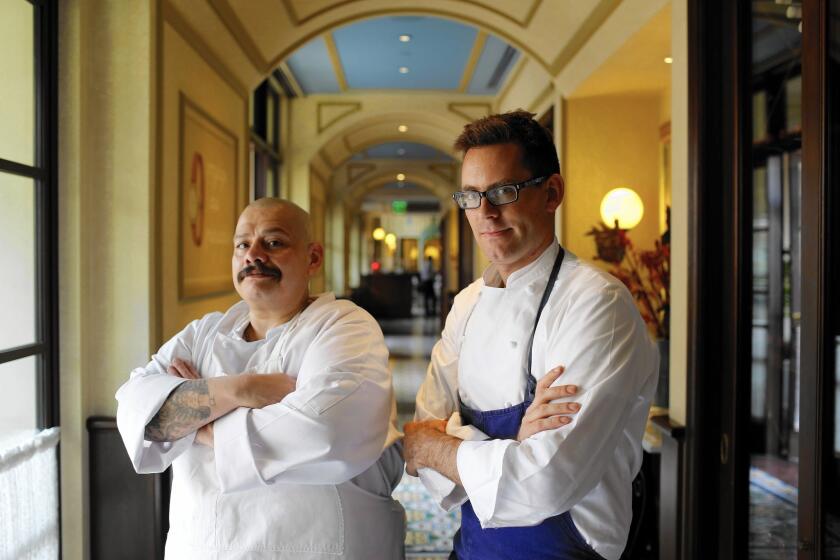These inmates are leaving gangs, stripping tattoos for jobs and better lives

WHEATON, Ill. — Under penalty of a beating or death, Erik Eck pledged at age 13 to adhere to the Latin Kings’ first rule: “Once a King, always a King.” Tattoos that bedeck his entire body express his fealty forever to one of the largest gangs in the U.S.
Now 36, the longtime Latin King enforcer is trying to leave anyway. He is seeking to scrub his past by erasing his gang tattoos through a new gang-cessation and jobs program he and 11 other inmates signed up for at a Chicago-area jail.
The Associated Press got exclusive access over two days to the first 12 inmates enrolled in the largely privately funded program at the DuPage County Jail and to their cellblock. For their safety, they’re isolated from the jail’s 500 other inmates, half of whom are in gangs.
Eck, jailed on burglary charges, earned the nickname “Hollywood” on the street for his swagger. But nightmares jarred him awake for days before he recently walked into the jail’s new tattoo-removal wing.
“This life is all I’ve ever known,” Eck said about agonizing over his decision to deface the tattoos that have been central to his identity for 20 years. “But it’s for the better.”
He added: “I feel like the change has officially begun.”
One goal is to land the inmates jobs in horticulture, welding and other fields they’re learning, said the program’s civilian director and chief architect, Michael Beary. He said there’s booming interest among businesses scrambling to address COVID-19-driven labor shortages.
Jobs training was available previously, but the gang and tattoo emphasis was added this year.
The year 2021 ended as one of the deadliest on record in recent years in Chicago
“I used to beg businesses to hire these guys. Now they say, ‘As long as they show up for work, we don’t care what they did,’” said Beary, a longtime business owner and executive director of the nonprofit JUST of DuPage, founded by a Roman Catholic nun to develop reentry programs for inmates.
The inmates aren’t promised jobs or reduced sentences. But if they graduate, they do get help searching for work and relocating away from their gangs. A letter from the sheriff touts their participation.
To graduate, participants must have their gang tattoos removed or covered with other tats. It’s proof, said DuPage County Sheriff James Mendrick, they’re serious about forsaking their old lives.
“It’s a point of no return,” he said. “It’s a commitment to themselves — and to us, that we aren’t wasting our time.”
The first tattoo Eck had covered was one on his arm of the Latin Kings’ initials. Jail-sanctioned tattooist Tom Begley inked the image of a deer over it in a four-hour session in February. Covering all of Eck’s gang tattoos will take months.
A roaring lion — a favorite Latin Kings symbol — was recently converted to a roaring bear. Eck has to be careful to pick animals that aren’t other gangs’ symbols. A rabbit, he said, is out. It’s a symbol of Latin Kings rival Two Six Nation.
Begley and his wife, Meagan Begley, of the suburban Electric Tattoo Parlor, jumped at the chance to lend their skills. Inmates painted a mural on a wall in the jail’s three-chaired tattoo studio. It says: “Hope, Purpose and Redemption.”
On a previous day, Tom Begley transformed a Satan Disciples tattoo on Jaime Marinez’s forearm from a Christian cross fashioned from rifles into the image of a vulture.
Nearby, Meagen Begley removed hand tattoos of 27-year-old Latin Count leader Gilberto Rios, wielding a pen-like tool to scrape off outer skin, then injecting a saline solution. That pushes ink into a scab, which flakes away over several weeks.
“There’s lots of crying by them,” she said, but not due to the pain. “These tattoos have been their identity. (Giving them up) is very emotional.”
Cooks come to Bouchon Beverly Hills after working at famous kitchens all over the world.
One she removed from Rios’ hand was a backward “D,” a symbol of disdain for Marinez’s gang.
The two chatted amiably, comparing tattoo work done on them that day.
“If they saw each other on the street,” Beary said, “they’d try and kill each other.”
Affluent DuPage County isn’t considered a hotbed of gangs. Mendrick, elected sheriff as a Republican, contends violent crime in his county is often committed by gangs from Chicago, in neighboring Cook County.
Mendrick is convinced the program, funded partly by church donations, will help reduce crime.
“I am a religious man,” he said. “I feel I am answering my calling.” Beary cites religion as a motivation, too.
The program also offers classes on the Bible, anger management and decision-making. And it provides counseling to drug-addicted inmates.
Once freed, Eck wants to own a business. He believes he can apply leadership skills honed in his gang.
He’s blunt about the perks of gang life.
“Being a gang member in my neighborhood was better than being the president of the United States,” he said. “I wanted the cars, the women ... the power, the respect.”
The killing of his best friend two months before Eck was jailed a year ago began changing his perspective. It was an internal hit by a Latin King who coveted his friend’s higher perch in the gang hierarchy, Eck said.
Luck runs out for Donald “Little Man” Ortiz, who refused offers of protection after being banished and marked for death by the powerful Mexican Mafia.
“He took 16 bullets, four in the face. It was like, enough is enough,” said Eck, adding that guilt at having hurt others also began weighing on him.
Other participants also cited trauma from years of gang violence as motivation for wanting out. Chicago police say most of the nearly 800 homicides in the city last year, the most in a quarter century, were gang-related.
In another tattoo session, Tom Begley traced a new image over a scar on Marinez’s chest from when he was shot last year at a stoplight.
The tattoo is of a clock set to 6:20, memorializing the date his father died of a heroin overdose on June 20, 2016. Marinez turns quiet when he mentions his dad.
The 21-year-old knows he’s putting himself in peril by spurning his gang.
“I don’t want to be doing this 50 years from now. … I know a lot of (adults) still in this life. And it’s just eating them up,” he said.
Eck credits Beary, whom he describes as a father figure, for persuading him to join the program.
“I have never had anyone come up to me and say there’s another way to live,” he said.
Eck wants to create a meaningful life. One more criminal conviction, he said, could send him to prison for life.
There are already signs of his transformation.
Speaking on a recent afternoon, he appeared startled when he realized what pronoun he was using to talk about the Latin Kings.
“I’m saying ‘they’ not ‘we,’” he said, looking at Beary sitting nearby and laughing.
He has stopped answering to his street name, too. When several inmates recently addressed him by it, he bristled.
“My name’s Erik,” he snapped. “Hollywood? ... I don’t know who you’re talking about.”
As he struggles to reinvent himself, he says he wants nothing to do with his gang persona.
“I want to be able to wake up and not see that person anymore.”
More to Read
Sign up for Essential California
The most important California stories and recommendations in your inbox every morning.
You may occasionally receive promotional content from the Los Angeles Times.













